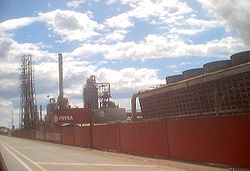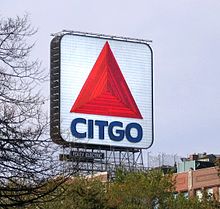- Petróleos de Venezuela
-
Petróleos de Venezuela S.A. Type State-owned enterprise Industry Oil and Gas Founded 1975 Headquarters Caracas, Venezuela Key people Rafael Ramirez, President Revenue  91.18 billion[1] (2009)
91.18 billion[1] (2009)Net income  $ 1.61 billion[1] (2009)
$ 1.61 billion[1] (2009)Total assets $ 137.2 billion[1] (2009) Parent Venezuelan government Subsidiaries PDV Marina
CVP
Pequiven
CIED
PDVSA Gas
PDV (Deltaven)
Palmaven
Electricidad de Caracas, C.A. (93.62%)[2]
Citgo (100%)[3]
more…Website www.pdvsa.com (Spanish) Petróleos de Venezuela, S.A. (PDVSA, Spanish pronunciation: [peðeˈβesa]) (Petroleum of Venezuela) is the Venezuelan state-owned petroleum company. It has activities in exploration, production, refining and exporting oil, as well as exploration and production of natural gas. Since its founding on 1 January 1976 with the nationalization of the Venezuelan oil industry, PDVSA has dominated the oil industry of Venezuela, the world's fifth largest oil exporter.
Between 2004 and 2010 PDVSA contributed $61.4 billion to social development funds. Around half of this went directly to various Bolivarian Missions, with the remainder distributed via the National Development Fund.[4]
Contents
Reserves and capacity
PDVSA El Palito Oil Refinery factory in Morón, Carabobo state, Venezuela.
Venezuela has 77.5 billion barrels (1.232×1010 m3) of conventional oil reserves according to PDVSA figures, the largest in the Western Hemisphere and making up approximately half the total. This puts Venezuela as fifth in the world in proven reserves of conventional oil. By also including an estimated 235 billion barrels (3.74×1010 m3) of tar-like extra heavy crude oil in the Orinoco Belt region, Venezuela claims to hold the largest hydrocarbon reserves in the world. Venezuela also has 150 trillion cubic feet (4.2×1012 m3) of natural gas reserves.
PDVSA has a production capacity, including the strategic associations and operating agreements, of 4 million barrels (640,000 m3) per day (600,000 m³). Officials say production is around 3.3 million barrels per day (520,000 m3/d) although most secondary sources such as OPEC and the EIA put Venezuela's output at least 500,000 barrels per day (79,000 m3/d) lower.
History
PDVSA purchased 50% of the United States gasoline brand Citgo from Southland Corporation in 1986 and the remainder in 1990.[5]
In December 2002 the Venezuelan general strike of 2002-2003 saw many of PDVSA's managers and employees (including the CTV trade union federation) lock out workers to pressure Venezuelan president Hugo Chávez to call early elections, and virtually stop oil production for 2 months. The government fired 19,000 employees and reestablished production with employees loyal to the Chávez government.
The International Labour Organization (ILO) called on the Venezuelan government to launch "an independent investigation into allegations of detention and torture", surrounding this strike. [3] The strike caused substantial macroeconomic damage, pushing unemployment up by 5% to a peak of over 20% in March 2003. [4] The company has since formed its own militia, which all employees join on a voluntary basis, to ward off a potential "coup" by the government. It considers itself virtually indistinguishable from the state, its social programs more or less running the country's socialist revolution.[6]
In 2005 PDVSA opened its first office in China, and announced plans to nearly triple its fleet of oil tankers, to 58. [5]
In April and May 2005 PDVSA, per an agreement signed between the governments of Venezuela and Argentina, sent 50 million tonnes of fuel oil to the latter, in order to alleviate the effects of an energy crisis due to a shortage of natural gas.
In November 2005, PDVSA and its subsidiary in the U.S., Citgo, announced an agreement with Massachusetts to provide heating oil to low income families in Boston at a discount of 40% below market price. [6] Similar agreements were later set up with other states and cities in the US Northeast including New York's Bronx, Maine, Rhode Island, Pennsylvania, Vermont and Delaware. Under the program, Citgo offered a total of around 50 million US gallons (190,000 m3) of heating oil at below market prices, equivalent to a discount of between 60 and 80 cents a gallon.
In February 2006 PDVSA completed ISO 9001:2000 process certification for its distribution system. [7]
On 28 July 2006, credit ratings agency Moody's Investor Service said it was removing its standalone ratings on PDVSA because the oil company does not provide adequate operational and financial information. PDVSA has still not filed its 2004 financial results with the US Securities and Exchange Commission that were due in June 2005.
In 2007, PDVSA bought 82.14% percent of Electricidad de Caracas company from AES Corporation as part of a renationalization program. Subsequently the ownership share rose to 93.62% (December 2008).[7]
PDVSA has made contributions to the protection of the environment through showcase projects in shanty towns and waste removal.[8]
PDVSA is Latin America's third-largest company, according to the a ranking of the region's top 500 companies from Latin Business Chronicle[9].
Presidents of PDVSA
- Rafael Ramírez (2004 - current) Minister of Energy and Oil (2005), M.Sc. Energy policy - UCV, B.Sc Mechanical Engineering - ULA.
- Alí Rodríguez Araque (2002–2004) Minister of Energy (1999), Secretary General OPEC (2001), Lic. Economics - UCV.
- Gastón Parra Luzardo (2002) Academic Vice-Rector - LUZ (1980–1984), Dean of the School of Social Sciences - LUZ (1972–1975). Lic. Economics - LUZ.
- Guaicaipuro Lameda (October 2000[10] - February 2002) Brigadier General of the Venezuelan Army.
- Héctor Ciavaldini (2000 - October 2000[10]).
- Roberto Mandini (1999).
- Luis Giusti (1994–1998) M.Sc. Petroleum Engineering - TU, B.Sc Petroleum Engineering - LUZ
- Gustavo Roosen (1992–1994) Minister of Education (1989), M.A. Comparative Law - New York University (NYU), B.A. Law - UCAB.
- Andres Sosa Pietri (1990–1992).
- Humberto Calderón Berti (1983–1984) Minister of Energy (1979–1982).
Overseas assets
- Citgo Petroleum Corporation, USA - Citgo is 100% owned by PDVSA.
- Ruhr Oel, Germany - PDVSA holds 50% of Ruhr Oel GmbH, the other half belonging to BP's German unit Aral AG. The possible sale of PDVSA's Ruhr shares to Russia's Rosneft was reported in August 2010.
- Nynäs Petroleum, Sweden - PDVSA owns a 50% stake with Finland's Neste Oil Oyj holding the other 50%.
- Bahamas Oil Refining Company (BORCO), Bahamas - PDVSA was the sole owner of this oil storage terminal in the Caribbean until April 2008. The new owners are Royal Vopak (20%) and First Reserve Corporation (80%). It is doing business as Vopak Terminal Bahamas.
- Hovensa LLC refinery, US Virgin Islands - Hovensa is jointly owned by PDVSA and Hess Oil Virgin Islands Corp.
- Isla refinery, Curaçao - PDVSA leases the Isla refinery on the island.
- BOPEC, Bonaire petroleum corporation 100% owned by PDVSA.
PDVSA also has offices in Argentina, Bolivia, Brazil, Colombia, China, Cuba, Spain and Netherlands.
See also
- Petrocaribe
- History of Venezuelan Oil Industry
- Corporación Trebol Gas C.A.
Notes
- ^ a b c "Fortune Global 500 2010: 56. PDVSA". Fortune Magazine. http://money.cnn.com/magazines/fortune/global500/2010/snapshots/6414.html. Retrieved 27 July 2010.
- ^ [1]
- ^ CITGO - About us
- ^ Venezuelanalysis.com, 5 August 2010, Auditors: Venezuela’s State Oil Company Recovering from Oil Price Slump
- ^ Company History, by Citgo, accessed on 10 December 2007.
- ^ German Zambrano, head of communications, cited in "Red Oil". Cutting Edge. 2009.
- ^ [2]
- ^ "Red Oil". Cutting Edge. 2009.
- ^ Largest companies in Latin América
- ^ a b Washington Post, 27 October 2000, "Chavez Taps Into Military to Fill Top Civilian Posts; Venezuelan Leans on Familiar Source"
External links
Categories:- Oil and gas companies of Venezuela
- Government-owned companies in Venezuela
- National oil and gas companies
Wikimedia Foundation. 2010.



